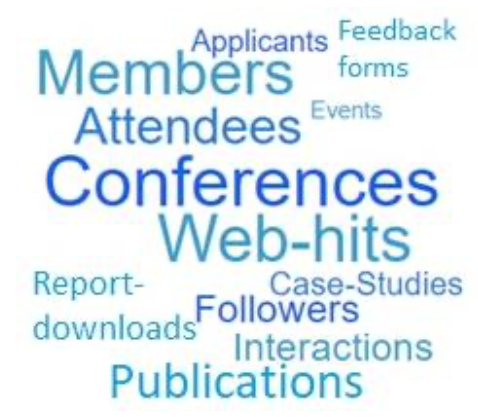This section provides general advice for measuring the impact of your Network. This summary was created in November 2021 after a discussion of the Network of Networks was convened by Connected Everything. We hope this will help other networks consider their impact more widely than the typical outputs often me. The contents for this section are:
What is it?
- We facilitate scientific discovery by bringing a range of academics together who otherwise would not meet
- We enable academics to meet with other interested parties with whom they might otherwise not know they by proving opportunities for interaction
- We forge relationships with Industry & government to ensure science is translated in tangible ways
- We create future leadership for the research area ensuring that it flourishes in across the UK and globally
- Impacts can be big and small and are equally valuable (e.g. for individual network members, the network community itself, through to UKPLC or government policy).
- Impacts are not only created directly by the network but also by the activities that Network+ can fund which can lead to publications and further research.
Different types of impact that networks could strive for
(Categories from Reed’s Research Impact Handbook)
Conceptual impact: A Network might seek to further existing approaches to relevant topics and extend our understanding.
Impact e.g. = innovation in theory and methods; high quality research
Cultural impact: A Network might seek to change the way things are done with respect to researcher-end user engagement.
Impact e.g. = increased willingness to engage across sectors and hence more effective collaborations, embedding Equality Diversity and Inclusion into our activities).
Connectivity impact: A Network might create / foster conditions where relationships can thrive and stimulating the formation of enduring multi-disciplinary, multi-institution teams. Academics increase their networks, build relationships with researchers from other disciplines, share their expertise, and understand more about and develop connections with non-academic stakeholders, including industry, government, the police, and citizens.
Impact e.g. = knowledge exchange between disciplines and across sectors, and research that makes a difference.
Instrumental impact: A Network might seek to influence policy and practice, for instance, activities to promote knowledge exchange and develop consensus positions. Impact e.g. = better-informed, more robust policy decision making. Capacity building impact: A Network might seek to build and nurture talent, through research support, guidance and training, networking events etc.
Impact e.g. = more diverse workforce, supporting the development of future leadership in the research area.
How do we measure this?
The easy to measure, quantitative outputs we often think of include:

Other forms of measurement could be:
- What is the legacy of network funded feasibility studies for example. What collaborations have resulted from the network and have these resulted in knowledge exchange, transfer, industry engagement for example, which would not have otherwise happened. Great question when asking for feedback.
- Stories (qualitative impact) often more meaningful and useful than metrics – via focus groups, emails, free text in surveys
- White papers
- Feedback from non academic partners involved in networks.
How do we promote this?
- Case studies are needed of the network success stories that can feed into government and UKRI (EPSRC for many Network of Network members)
- Create a strapline on what the most important impact of your network is and have the evidence to hand to back this up! Examples: “SPRITE+ is primarily a vehicle for collaboration”
- Social media presence is important.
What is the audience you are trying to reach?
- Are you trying to demonstrate that you have met the terms of a grant award?
- Are you trying to engage government or industry partners with your network to broaden membership? (case studies referenced above are particularly helpful here, as are videos, podcasts etc)
- Are you trying to engage academia to broaden your network expertise? (in which case, demonstrating academic excellence might play a key role?)